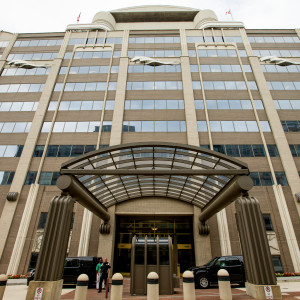The federal agency charged with enforcing Obama administration net neutrality rules extended the deadline to comment on a Republican plan to repeal them over the weekend, as millions of fake comments pour into the agency.
Regulators on the Federal Communications Commission reluctantly extended the deadline Friday from Aug. 16 to Aug. 30. That gives the public another two weeks to comment on Republican FCC Chairman Ajit Pai’s plan to scale back and possibly eliminate altogether Obama-era net neutrality rules barring internet providers from blocking, throttling, or favoring certain web traffic.
“While it is the policy of the commission that ‘extensions shall not be routinely granted,’ we find that an extension of the reply comment deadline is appropriate in this case in order to allow interested parties to respond to the record in this proceeding,” head of the FCC’s Wireline Competition Bureau Daniel Kahn said Friday.
Almost half the Democrats in the U.S. Senate and nearly a dozen pro-net neutrality public interest groups asked the FCC to extend the deadline in early August. All cited the substantial increase in comments — more than 15 million — than the last net neutrality proceeding in 2014, when the docket reached a record-setting 4 million.
At the time the Democrat-controlled FCC gave the public two months to reply to the initial round of comments, while the current commission only provided 30 days — half as much time to respond to almost four times the number of comments.
Critics opposed to Pai’s plan asked for an eight-week extension, but received only two. According to the FCC, that’s because the majority of comments consist of only a couple sentences, while millions of others are filed with false information.
“Opponents also assert that the ‘vast majority of comments filed merely state (often in one or two sentences) the commenter’s ultimate policy preferences,’ and that ‘many of these comments are apparently fabricated,'” the FCC said Friday. “In support of these assertions, opponents state that ‘[o]ne study revealed that over seven million of the comments filed between July 3 and August 4, 2017 appear to be entirely fraudulent.'”
A trade group representing AT&T, Verizon, and others opposed the extension, citing a study by the conservative-leaning National Legal and Policy Center (NLPC) that found a half-million fake comments in May and 1.3 million fake comments from Russia and other locations outside the U.S. in July, during the first round of comments.
In its latest study, the group found 5.8 million fake comments filed during the reply comment period between July 17 and Aug. 4, which if accurate, accounts for almost a third of the total comments.
The group focuses on fake comments filed in support of the Obama-era net neutrality rules and against the Republican plan to repeal them. The newest vein of these fake comments came almost exclusively from fake addresses and emails in the U.S. All originate from 10 email address domains associated with a fake email generator program, and use the same language: “I am in favor of strong net neutrality under Title II of the Telecommunications Act. Sincerely . . .”
NLPC uploaded 1.5 million comments of sample data online for verification, but said the entire data set is “too large to put online.” A “spot check of several of the 1.5 million” filed between during the reply period “showed that every address checked was invalid.” By that measure the group assumes at least 95 percent of the comment addresses are fake, mixing street addresses with mismatched cities and states.
“As we have uncovered in our previous analyses, the gaming of the comment submission process has gotten out of hand,” NLPC President Peter Flaherty said. “With almost 6 million comments in the docket now appearing to be fake, we have decided to make the data we uncovered publicly available in order for researchers and analysts to explore the data and develop their own insights.”
Fake comments aren’t limited to one side of the debate. Pro-net neutrality advocates including Fight for the Future found more than 450,000 fake comments filed in support of the Republican repeal plan. Some include names, addresses and other personal information of real individuals who claim they didn’t file them.
NLPC is asking Congress to investigate fake comments submitted to both sides of the debate, and said in May it would submit its findings to a professional data forensics expert for a more thorough analysis.

